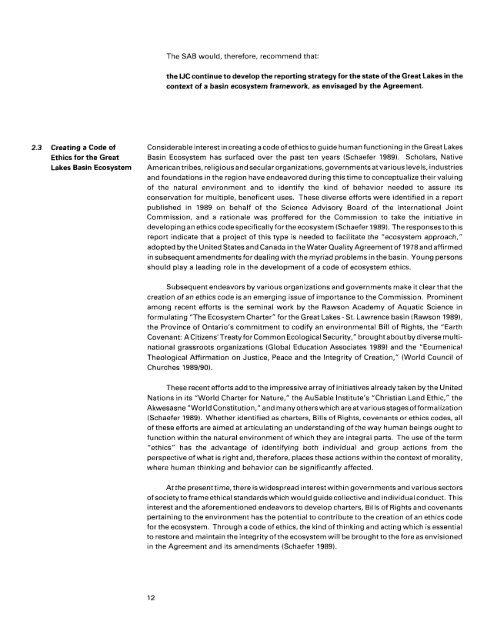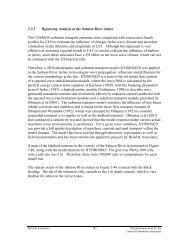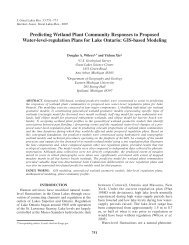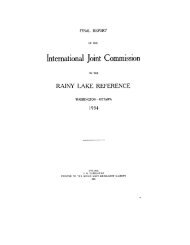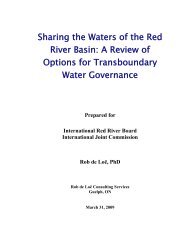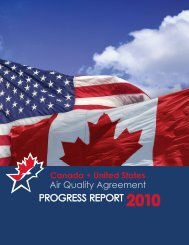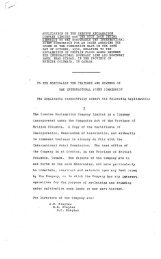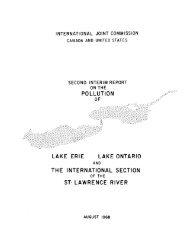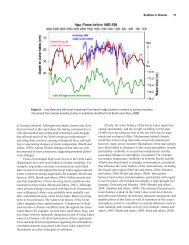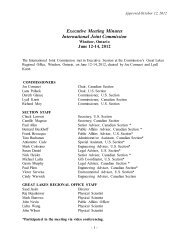International Joint Commission
International Joint Commission
International Joint Commission
Create successful ePaper yourself
Turn your PDF publications into a flip-book with our unique Google optimized e-Paper software.
The SAB would, therefore, recommend that:<br />
the IJC continue to develop the reporting strategy for the state of the Great Lakes in the<br />
context of a basin ecosystem framework, as envisaged by the Agreement.<br />
2.3 Creating a Code of Considerable interest in creating a code of ethicsto guide human functioning in the Great Lakes<br />
Ethics for the Great<br />
Lakes Basin Ecosystem<br />
Basin Ecosystem has surfaced over the past ten years (Schaefer 1989). Scholars, Native<br />
American tribes, religious and secular organizations,governmentsatvarious levels, industries<br />
and foundations in the region have endeavored during this time to conceptualize their valuing<br />
of the natural environment and to identify the kind of behavior needed to assure its<br />
conservation for multiple, beneficent uses. These diverse efforts were identified in a report<br />
published in 1989 on behalf of the Science Advisory Board of the <strong>International</strong> <strong>Joint</strong><br />
<strong>Commission</strong>, and a rationale was proffered for the <strong>Commission</strong> to take the initiative in<br />
developing an ethicscodespecificallyforthe ecosystem (Schaefer 1989). The responsestothis<br />
report indicate that a project of this type is needed to facilitate the “ecosystem approach,”<br />
adopted by the United States and Canada in the Water Quality Agreement of 1978 and affirmed<br />
in subsequent amendmentsfor dealing with the myriad problems in the basin. Young persons<br />
should play a leading role in the development of a code of ecosystem ethics.<br />
Subsequent endeavors by various organizations and governments make it clear that the<br />
creation of an ethics code is an emerging issue of importance to the <strong>Commission</strong>. Prominent<br />
among recent efforts is the seminal work by the Rawson Academy of Aquatic Science in<br />
formulating “The Ecosystem Charter” for the Great Lakes - St. Lawrence basin (Rawson 1989),<br />
the Province of Ontario‘s commitment to codify an environmental Bill of Rights, the ”Earth<br />
Covenant: ACitizens’Treatyfor Common Ecological Security,” brought about by diverse multinational<br />
grassroots organizations (Global Education Associates 1989) and the ”Ecumenical<br />
Theological Affirmation on Justice, Peace and the Integrity of Creation,” (World Council of<br />
Churches 1989/90).<br />
These recent efforts add to the impressive array of initiatives already taken by the United<br />
Nations in its “World Charter for Nature,” the AuSable Institute‘s ”Christian Land Ethic,” the<br />
Akwesasne ”World Constitution,” and manyotherswhich areatvariousstagesofformalization<br />
(Schaefer 1989). Whether identified as charters, Bills of Rights, covenants or ethics codes, all<br />
of these efforts are aimed at articulating an understanding of the way human beings ought to<br />
function within the natural environment of which they are integral parts. The use of the term<br />
”ethics” has the advantage of identifying both individual and group actions from the<br />
perspective of what is right and, therefore, places these actions within the context of morality,<br />
where human thinking and behavior can be significantly affected.<br />
At the present time, there is widespread interest within governments and various sectors<br />
of societytoframeethical standardswhich would guidecollective and individual conduct. This<br />
interest and the aforementioned endeavors to develop charters, Bills of Rights and covenants<br />
pertaining to the environment has the potential to contribute to the creation of an ethics code<br />
for the ecosystem. Through a code of ethics, the kind ofthinking and acting which is essential<br />
to restore and maintain the integrity of the ecosystem will be brought to the fore as envisioned<br />
in the Agreement and its amendments (Schaefer 1989).<br />
12


